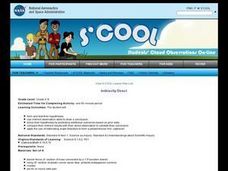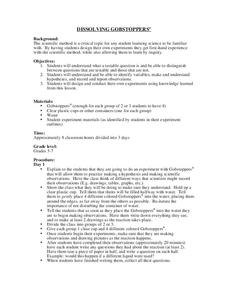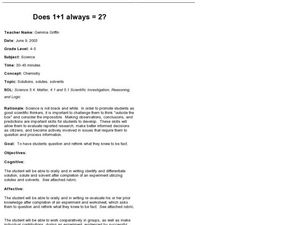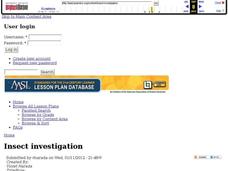Novelinks
Wildwood Dancing: Questions using Bloom’s Taxonomy of Thinking Process
Readers respond to a series of questions focused onJuliet Marillier's young adult novel Wildwood Dancing, and crafted to reflect the levels in Bloom's Taxonomy.
Curated OER
Harry Potter and the Prisoner of Azkaban: Bloom's Taxonomy
Take a moment in your Harry Potter unit to assess comprehension. Readers use knowledge gained for the text and from their own experience to answer seven questions based on events in chapters four and five of Harry Potter and the Prisoner...
Novelinks
The Little Prince: Blooms’ Taxonomy Questions
Question what you read with a lesson based on Bloom's Taxonomy. As kids read The Little Prince by Antoine de Saint-Exupéry, they formulate questions with cues from a graphic organizer, and answer them to work on critical thinking skills.
Novelinks
Nightjohn: Bloom's Taxonomy Questions
After completing Nightjohn, Gary Paulsen's young adult novel about slavery set shortly before the Civil War, readers respond to a series of questions crafted to reflect Bloom's taxonomy.
Brigham Young University
A River Runs Through It: Blooms Taxonomy
Designed for teachers who use Norman Maclean's autobiographical A River Runs Through It, this one-page resource offers discussion question structured using Bloom's Taxonomy.
Novelinks
Things Fall Apart: Bloom’s Taxonomy
Promote critical thinking and literary analysis with a short activity. Readers of Chinua Achebe's Things Fall Apart respond to a series of questions modeled on Bloom's Taxonomy.
Curated OER
Indirectly Direct
Young scholars use prior knowledge of angle and lines as they conduct an experiment with a rolling marble to determine the shape of a mystery object located under a metal pie tin.
Curated OER
The Mozart Effect
Music has been said to effect short term memory. Learners test out this hypothesis, graphing how knowledge retention in a biology classroom changes when music is played in the background. In the end, a better appreciation of the dynamics...
Curated OER
How to Float an Egg
Use the scientific method to experiment with an egg. Your class can examine buoyancy and density by finding how many spoons of salt are needed to float an egg. They can predict, experiment, record data, and analyze results.
Curated OER
Two Beets Or Not Two Beets—What Is Your Question?
Students use the scientific method to test an idea regarding the structures of a plant as it supports the biological evidence for life. In this growing roots instructional activity, students use organizing sheets to record their...
Curated OER
SAFETY KNOWLEDGE BASE CHANGES
Students research and formulate a hypothesis for research to correlate changing safety regulations in regards to personal and environmental safety polices for storage, handling and disposal of chemicals, risk involved in hazardous...
Curated OER
Where is the Science?: Design as an Introduction to the Scientific Method
Students work to create a design that will protect an egg from being dropped from a one story floor. They test their prototype after it is completed. They write clear instructions and link aspects of the design process to the scientific...
Curated OER
Scientific Method
Students examine the steps of the scientific method. They define related vocabulary terms, view a PowerPoint presentation, and apply and identify the steps of the scientific method for an online experiment scenario.
Curated OER
The Scientific Revolution in England and Europe
Students read and discuss Scientific Revolution information sheet and the diagram concerning the causes of the Scientific Revolution. They construct a timeline including Aristotle, Democritus, Copernicus, Bacon and Descartes along with a...
Curated OER
Cooking Up the Scientific Method
First graders identify the different steps of the scientific method. In this life science activity, 1st graders apply this method when conducting a series of hands-on activities. They collect data and write observations in their journals.
Curated OER
Writing Exercises: The Scientific Revolution II
Get to the point with the Scientific Revolution using this simple short-answer worksheet! Three writing prompts have scholars detail the period, explain Galileo's contributions, and outline the scientific method. There is no...
Curated OER
Thinking About Technology: What Is It? How Can It Help Us?
What is technology and how can it help us? Using a worksheet, students read a list and choose practical applications of scientific knowledge, brainstorm examples of home, school and hospital technology, graph answers in a pie chart, and...
Curated OER
Science Crossword Puzzles: Scientific Instruments
Use this crossword puzzle to test your learners' knowledge of scientific instruments. The majority of the instruments included on this puzzle are related to earth science, so that would be the ideal setting in which to use this resource....
Curated OER
Evaluating the Strength of Scientific Evidence: The Rediscovery of the Ivory-billed Woodpecker
A happy discovery occurred in Arkansas in 2004: a woodpecker, believed to be extinct since the 1940s, reappeared! Or did it? Middle to high school ecologists examine scientific evidence and use critical-thinking skills to determine...
Curated OER
Research Ethics
Young scientists discuss the results of carelessness during experimentation and the temptation to misrepresent findings. These activities are intended to develop the ability to identify scientific error, misconduct, and fraud. Use this...
Curated OER
Dissolving Gobstoppers
Students design their own experiments . They study the scientific method and determine what a testable question is. They distinguish between questions that are testable and those that are not. They identify variables, make and understand...
Curated OER
Does 1 + 1 always = 2
What a great way to explore the scientific process! Learners conduct an experiment in which they use sugar and water to illustrate the concept of solutes and solvents. With this hands on approach, they are bound to remember what they...
Curated OER
Investigate Science Using Crayfish
Young scientists discover the importance of scientific investigation by observing live crayfish. They carefully observe the patterns of crayfish in different environments. Then they discuss their conclusions and define what all living...
Curated OER
Insect Investigation
Investigation is a brilliant way to spark scientific inquiry. First graders will identify, research, and report what they have learned about a mysterious bug found on the playground. They will use multimedia resources for research and...

























